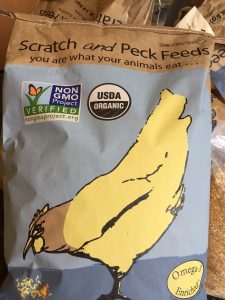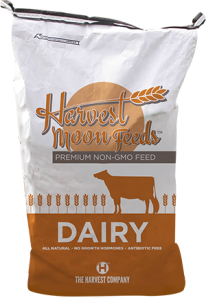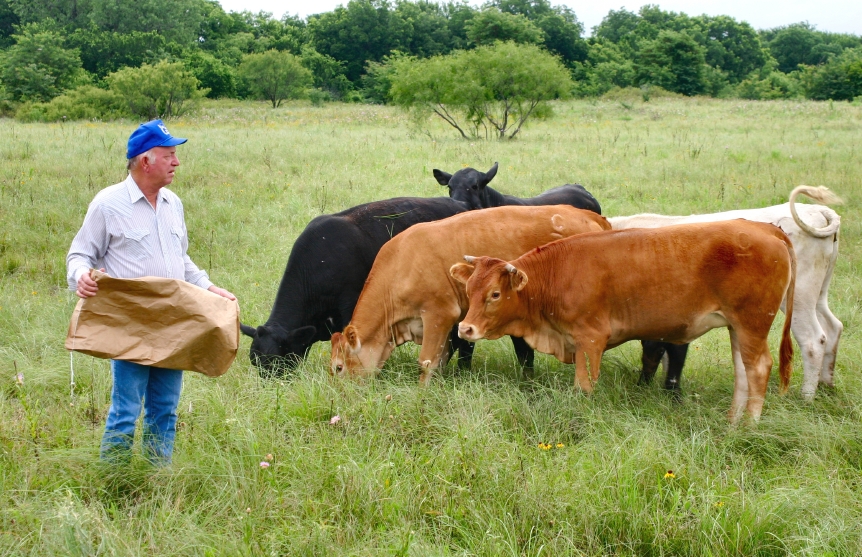Suppliers of organic and non-GMO feed are seeing increased demand for their products during the COVID-19 pandemic. The demand is driven by increased sales of organic eggs, chicken, turkey, and dairy products and by the growing trend of people staying at home to produce their own food and wanting to increase their own food security.
“Perfect storm” to encourage people to produce their own food
 Washington State-based organic feed supplier Scratch and Peck Feeds has seen a 25% to 30% increase in sales since the pandemic began, says Rich Fowles, company CEO.
Washington State-based organic feed supplier Scratch and Peck Feeds has seen a 25% to 30% increase in sales since the pandemic began, says Rich Fowles, company CEO.
“We’ve seen a spike in demand. People believe in organic, ethical treatment of animals, sustainable agriculture.”
“Food insecurity becomes real to people during a pandemic like this,” says Diana Ambauen-Meade, Scratch and Peck’s owner and chief integrity officer. “They think ‘we have to grow our own food’ rather than rely on the mass market.”
As much as 80% of Scratch and Peck’s business is selling to people who raise chickens in their backyards, a growing market with some 10 million U.S. households.
“That’s a whole lot of people,” Fowles says. “We’re just scratching the surface, and there’s a lot of opportunity for us to grow.”
 Ryan Schwieterman, CEO of The Harvest Company, which supplies non-GMO feed to backyard chicken farmers and small farms, says COVID-19 was a “perfect storm” to encourage people to produce their own food.
Ryan Schwieterman, CEO of The Harvest Company, which supplies non-GMO feed to backyard chicken farmers and small farms, says COVID-19 was a “perfect storm” to encourage people to produce their own food.
“Demand for feed is strong. When grocery stores ran short, consumers started to reevaluate food security in their own homes, and produce their own food. There’s a spillover into meats, and chickens are the easiest to raise,” he says.
Jason Garber, owner of Ohio-based Kraut Creek Non-GMO Feeds, says that sales of his company’s non-GMO feed products are “up significantly” during the pandemic. Kraut Creek also sells feed primarily to the backyard chicken market and small farms.
While he credits the COVID-19 pandemic for an increase in sales, Garber also sees a larger trend of people wanting to eat healthier foods.
“There are more and more people developing food allergies, and that’s directly correlated to gut health. Pesticides and processed foods have compromised people’s gut health,” he says.
At Virginia-based New Country Organics, online sales of organic feed “have taken off since COVID-19,” according to CEO Jim Campbell. “There’s been a definite shift there,” he says.
New Country Organics sells to a range of customers in the poultry market from backyard farmers to small and large organic farms.
Campbell says there was panic buying in March when the pandemic hit the U.S. but now he sees business getting back to normal.
“You don’t know whether the growth you’ve experienced is really a trend upwards or a temporary reaction to the news. That’s why in some ways it’s difficult to be definitive.”
Campbell also thinks the pandemic is causing people to be more self-reliant in producing food.
“I think people want to cut down on their external interactions, or if the food supply is disrupted, they’ve got something in the backyard they can eat and live on.”
“Business for growing organic grain for feed is healthy”
Sales of organic and non-GMO animal products such as eggs, chicken, turkey, and dairy are strong, which is driving the feed demand, says David Becker, organic and non-GMO analyst at The Jacobsen, a commodity price reporting firm. Sales of animal-based organic products, particularly eggs, are up 15% in the first five months of 2020, while sales of similar non-GMO products are up 20% during the same time period, according to Becker.
People stocked up in March but Becker says “the demand for such products hasn’t gone down since.”
The demand for non-GMO animal-based products “is picking up and accelerating more than organic,” Becker says.
But he also says the non-GMO feed market is “more difficult to figure out.” The non-GMO feed business is centered primarily in Indiana, Ohio, and Michigan, three leading non-GMO soybean producing states.
Overall, Becker says: “The business for growing organic grain for feed is healthy.
COVID has accelerated the demand, and for the moment you don’t see it stopping.”
Taking a different perspective, Alex Wolf, organic product group manager at Scoular, says the organic feed market has plateaued over the past 18 months.
“It’s been relatively flat with a little bit of growth but not enough to quantify.”
Wolf focuses on the bulk feed market, which supplies larger organic poultry and dairy processors, as opposed to the smaller bagged feed and backyard chicken market. The poultry market is comprised of egg laying and broiler chickens; egg layers are the biggest segment of the market.
Prices for organic feed grains, particularly corn, are at the lowest levels in several years at around $7.00 per bushel, according to some sources. Wolf says the lower prices are due to increased organic corn acreage in the U.S., resulting in a greater supply of organic corn. The lower prices are likely to encourage more use of U.S. domestic corn and could grow the overall demand for organic products.
“Lower organic grain prices make it more economical for downstream livestock producers and consumers to afford organic products,” Wolf says.
But Becker questions whether farms will want to grow organic corn at such low prices.
“Will organic farmers be comfortable selling organic corn at $7.00 in the Midwest? I’m not sure.”
COVID and supply challenges
Despite the increased business, organic and non-GMO feed suppliers face challenges. The pandemic has forced feed suppliers to interact with customers by phone, email, or Zoom meetings instead of meeting in person.
“It’s definitely different,” Schwieterman says. “I prefer to meet face to face. Not being able to presents its own set of challenges.”
Schwieterman also says freight and logistics have been a challenge because of the pandemic.
“Freight carriers are mostly moving just essential items, so they are charging more to carry your item,” he says.
A few feed suppliers say that getting a consistent supply of ingredients such as organic grains is also a challenge.
“We have high standards sourcing feed and need to have the right nutritional values like protein. Not every farm produces that quality of grain,” Fowles says. “We have a consistent stable supply now but it’s on our radar as we grow.”
“The biggest challenge is a consistent supply of certified (organic) ingredients,” says Mark Hudson, manager at Majestic Milling, a supplier of organic and non-GMO feed. “There is lots of organic corn, but it’s hard to buy organic soybeans.”
A big reason for the lack of organic soybeans is that India, the largest supplier of organic soybeans and soybean meal to the U.S., has been in lockdown since March because of the pandemic. Though they’ve partially opened since then, exports to the U.S. have been reduced significantly.
Organic fraud is also an ongoing concern as there have been several incidents of both fraudulent organic imports into the U.S. and multi-million dollar domestic fraud by several Midwest farmers.
“There’s a challenge in maintaining organic integrity because the price premium can attract bad actors, and it’s a challenge for organic certifiers to detect the fraud,” Wolf says.
Meanwhile, non-GMO feed suppliers report no sourcing problems.
“We source locally; there are no challenges sourcing non-GMO corn or soybean meal. That’s been the easy part,” says Schwieterman whose company is building a new non-GMO feed mill in Paulding, Ohio.
“We don’t really know the impact of COVID yet”
Hudson would prefer to buy U.S. organic soybeans. “There is a lot of room for farmers to grow organic in the U.S.,” he says.
That is happening, says Wolf. “There are still acres being transitioned. The percentage increase we are seeing now is probably not as great as from 2017 to 2019 but I think the acres are still growing.”
Meanwhile, Scratch and Peck and New Country Organics say they only buy U.S. or Canadian grains. Both companies sell feed that doesn’t contain soy so they don’t have the challenge of sourcing organic soybeans.
Feed suppliers say that non-GMO is an important attribute their customers want and communicating the benefit of non-GMO versus organic can be a challenge.
“People feel that organic is non-GMO. I’ve spent a lot of time educating people that we could no longer safeguard corn from GMOs, and that there had to be third party verification for non-GMO,” says Ambauen-Meade.
But Campbell sees the opposite problem. “One of the bigger challenges is the confusion you see in the market with consumers not having the knowledge of non-GMO versus organic. People buy non-GMO thinking it’s organic but they don’t understand the difference, and that tends to muddy the waters.”
While organic and non-GMO feed suppliers see a bump in sales during the pandemic, they realize the future is uncertain.
“We’re not yet through the COVID thing. We’ve got some time to see how this pans out,” Campbell says.
“The truth is that we don’t really know the impact of COVID yet because we’ve been only dealing with it for three months and the story hasn’t been fully written,” Wolf says.









